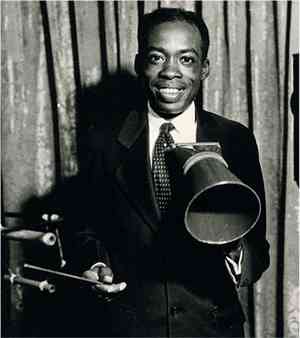


DeFord Bailey
Source: DeFord Bailey
Born on 14 December 1899 in Smith County, Tennessee, harmonica player, DeFord Bailey, was a country musician, the first to play on the 'Grand Ole Opry' in 1925. The Grand Ole Opry was originally a Nashville radio broadcast (WSM Radio) called 'Barn Dance', first airing in 1925. It's name was changed due to a joke by radio announcer, George Hay, referring to his country music broadcast as a grand opera. ('Barn Dance' followed a classical music show.) To quote, as Hay was introducing Deford Bailey: "For the past hour we have been listening to music largely from Grand Opera. But from now on we will present the Grand Ole Opry." The name stuck, making Bailey the Opry's first performer.
Recording wasn't the focus of Bailey's career, but his first were also in 1927, those on April 1 in Atlanta, GA: 'Pan American Express' with 'Hesitation Mama', neither issued. American Music places his first session to issue on April 18 in New York City for his composition, 'Pan American Blues' (Brunswick 146 / Vocalion 5180).
'Pan American Blues' Harmonica by Deford Bailey
18 April 1927 in NYC E22475 Brunswick 146 / Vocalion 5180
Composition: Bailey
'Dixie Flyer Blues' Harmonica by Deford Bailey
19 April 1927 in NYC E22501 Brunswick 146 / Vocalion 5180
Composition: Bailey prob inspired by Bessie Smith's version of 1925
Other of Bailey's compositions were 'Ice Water Blues' and 'Davidson County Blues', those spread along in Nashville on October 2, 1928 (Bluebird B5147). Recordings followed into the thirties, though DeFord was largely a radio performer, Radio WSM in particular. Per 'Fox Chase' below, its first recorded version is thought to have been by Henry Whitter on August 2, 1927, released November 4 that year.
'Ice Water Blues' Harmonica by Deford Bailey
2 Oct 1928 in Nashville BVE-47112 Bluebird 5147 / Victor V-38014
Composition: Bailey
DeFord quit the music profession altogether in 1941 upon being fired by WSM for playing tunes forbidden without contract with ASCAP (the royalties organization / Wikipedia). Though continuing to perform on rare occasions, Bailey thereafter made his living renting out rooms in his home and shining shoes. Bailey's now most famous tracks arrived between 1974 and 1976 when David Morton recorded Bailey at his home in Nashville, those eventually issued as 'The Legendary DeFord Bailey: Country Music's First Black Star' on TFS 122 in 1998.
'Kansas City Blues' Guitar and vocal by DeFord Bailey
6 Dec 1947 at the Grand Old Opry in Nashville
Composition: Jim Jackson 1927 (lyrics altered by Bailey)
'Fox Chase' Harmonica by DeFord Bailey Television
Sometime 1967 at the Grand Old Opry in Nashville
Composition: Traditional
'Pan American Blues' Harmonica by DeFord Bailey Television
Sometime 1967 at the Grand Old Opry in Nashville
Composition: Bailey
'The Legendary DeFord Bailey: Country Music's First Black Star'
Album recorded at Bailey's Nashville home by David Morton Oct 1974-Oct 1976
All Music Discogs Music Brainz
Bailey died in Nashville on July 2, 1982.
Sources & References for DeFord Bailey:
Eugene Chadbourne (All Music)
Country Music Hall of Fame (alt)
Keith Summers (The Legendary DeFord Bailey / TFS 122 / 1998)
Tennessee Folklore Society (The Legendary DeFord Bailey / TFS 122 / 1998)
VF History (notes)
Charles K. Wolfe (Tennessee Encyclopedia)
Audio of Bailey: Internet Archive
Documentaries: A Legend Lost / Kathy Conkwright / 2002: IMDb PBS
Recordings by Bailey: Catalogs: 45 Worlds Discogs Rocky 52 RYM
Recordings by Crosby: Sessions:
DAHR (1927-28)
Praguefrank's (1927-76)
Tony Russell (Country Music Records: A Discography 1921-1942 / Oxford University Press / 2004)
Stefan Wirz (American Music)
Bibliography:
DeFord Bailey: A Black Star in Early Country Music (David C. Morton / Charles K. Wolfe / University of Illinois Press / 2023)
Authority Search: VIAF
Classical Main Menu Modern Recording
|
|
hmrproject (at) aol (dot) com